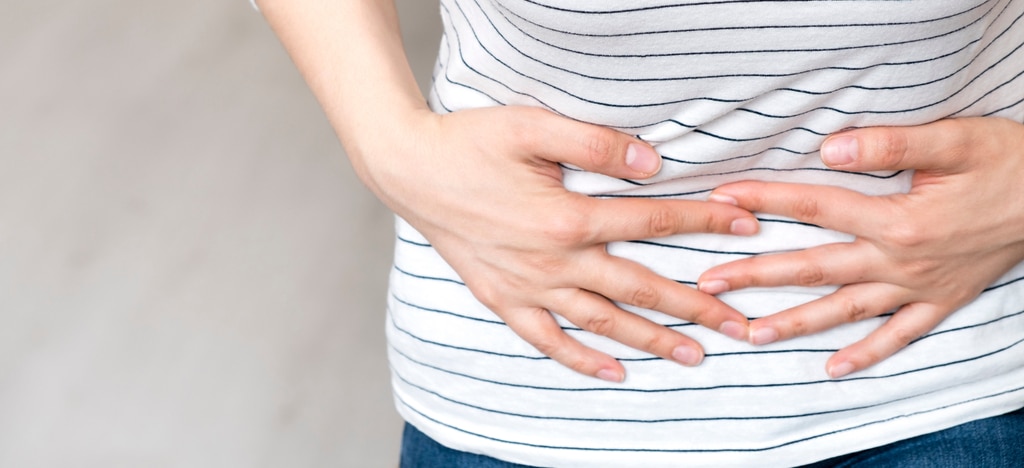
Bloating is a common symptom that many of us have experienced especially after over indulging in a big meal or perhaps over the recent festive season.
Bloating is a sensation of abdominal fullness, often due to gas. In most cases, bloating is not permanent and can usually be cleared up by making some changes to your diet and daily routine.
Stomach bloating can sometimes signify other underlying medical conditions so it is important to seek medical advice for persistent bloating symptom.
What is the bloated feeling?
Most of us have experienced the feeling of being bloated – when your tummy feels full, tight and uncomfortable. Sometimes, we see our stomach protruding out. Bloating may be accompanied by:
- Frequent burping or belching
- Excessive wind (flatulence)
- Abdominal rumbles and gurgles
- Discomfort and pain
What causes bloating?
Gas is the most common cause of bloating. Causes of gas include:
- Swallowing air – this occurs when we are eating and drinking too fast, chewing gum, smoking or drinking carbonated beverages. The swallowed air usually comes back out as a burp. Some people swallow air as a nervous habit, even when they are not eating or drinking. This condition is known as aerophagia.
- Acid reflux, inflammation of the stomach lining (gastritis) or an infection with the bacterium, Helicobacter pylori can also lead to bloating and belching. In these cases, there may be other symptoms such as heartburn and abdominal pain.
- Certain foods like beans, broccoli, cabbage, Brussels sprouts, carrots, prunes and apricots. These contain sugars and starches that bacteria in the gut digest on producing excessive gas.
- Sweeteners added to food eg sorbitol, mannitol and xylitol are indigestible carbohydrates and may result in increased gas. Fructose, a natural sugar added to many processed foods, is also difficult for many people to digest.
- Diary products – may cause bloating in those who have a certain degree of lactose intolerance.
- High fibre foods have many health benefits but they are also great gas producers. Increasing your fluid intake helps move the fibre through the digestive system and prevents bloating.
Other causes of bloating also include:
- Constipation – the longer the stool remains in the colon, the more time the bacteria have to ferment resulting in more gas and bloating.
- Digestive disorders like IBS (Irritable Bowel Syndrome), Coeliac disease and inflammatory bowel disease like ulcerative colitis, Crohn’s disease can cause gas, bloating and distension.
- Food allergies, sensitivities and intolerance are also common reasons for gas and bloating. Foods that can cause gas include diary, gluten-containing foods (bread, pasta, cereals, etc) and certain fermentable carbohydrates called FODMAPs.
- Gastroparesis – this condition causes delay emptying of the stomach content causing bloating, nausea and occasionally bowel obstruction.
How can you relieve that bloating feeling?
In many cases, bloating can be diminished or prevented by adopting a few simple lifestyle changes.
- Avoid overeating
- Eat and drink slowly to avoid swallowing air
- Avoid carbonated drinks and beer
- Eliminate certain foods – like beans, lentils, cabbage, onions, cauliflower, whole grain foods and certain fruits
- Avoid rich and fatty foods – fats take longer to digest than protein and carbohydrates allowing the food to ferment for longer
- Temporarily cut back on high fibre foods and then slowly reintroduce back into your diet as fibre has many benefits
- Probiotics – the good bacteria in probiotics helps to repopulate the healthy gut bacteria that can help with bloating symptom. You can take a probiotic supplement or eat more probiotic foods like kimchi, saurerkraut, yoghurt and kefir
- Certain herbs, spices and tea have natural digestion soothing properties eg. ginger, aloe vera, fennel and dandelion
- Medications – there are over the counter remedies to alleviate the bloating or you can visit your doctor for prescription medications
When should you seek medical help?
Speak to your doctor if your bloating and abdominal discomfort is not relieved by dietary and lifestyle changes. It is important that you consult your doctor if your bloating is accompanied by any of the following:
- Persistent and severe abdominal pain
- Blood in the stool or black tarry stool
- Diarrhoea
- Unexplained weight loss
- Vomiting
- Worsening heartburn or chest discomfort
- Loss of appetite or feeling full quickly
- Fatigue
- In women with persistent bloating, it is important to see your doctor for a gynaecological examination to rule out any ovarian pathologies.
































